Oleksandr Tishura
He is a person who pushes the development of science and highlights promising technologies. Outside of work, he coordinates volunteers and conducts analytical and statistical activities at B50.
His studies at the History Faculty and his engineer parents taught Oleksandr Tishura to be thorough in everything from analyzing a research project to organizing aid for the victims. His attention to detail has already helped systematize many organizational processes at B50. And there is still so much more to come.
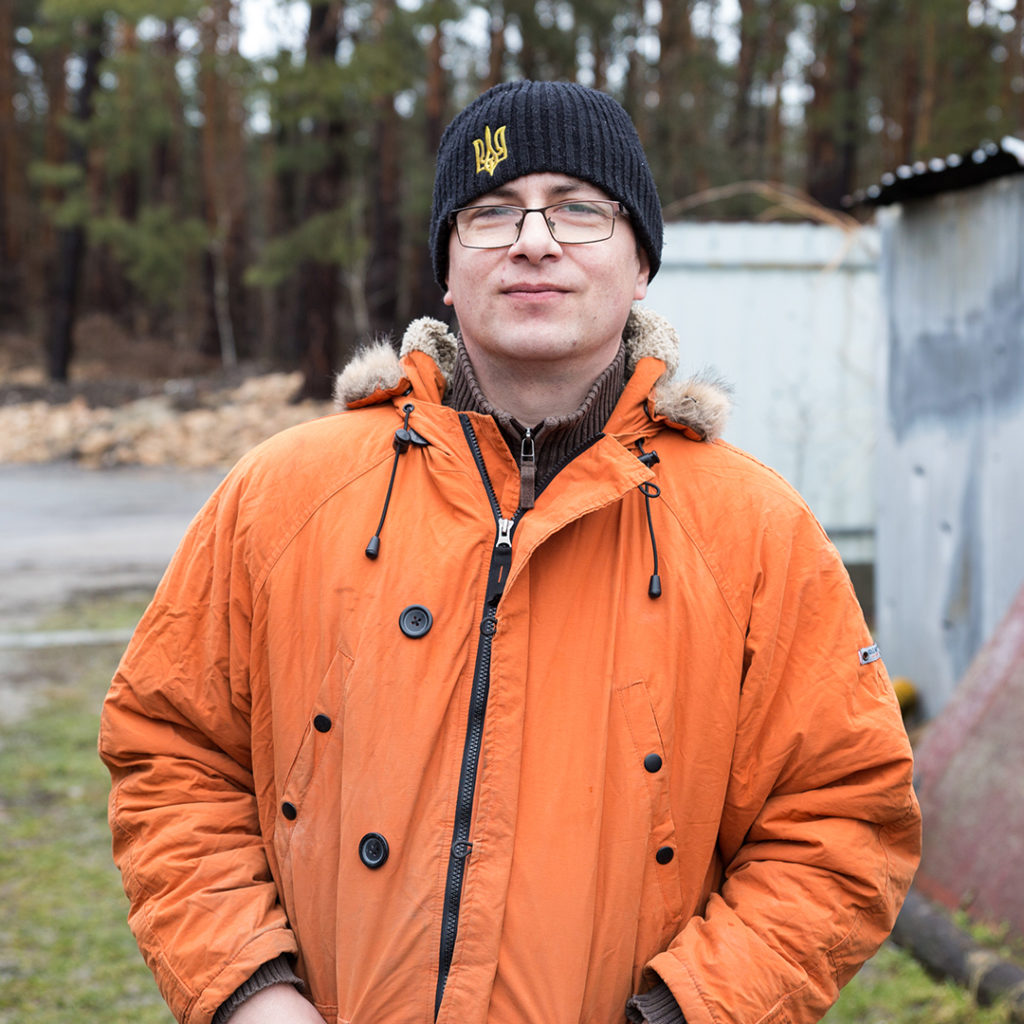
Read #B50heroes interview with Oleksandr Tishura:
- how he coped with being separated from his wife and daughter at the beginning of the invasion;
- why he actively volunteers in B50 and is also involved in organizational activities;
- who is an example of a public activist for Oleksandr;
- the state of his office at the Ministry of Education and Science after the October shelling of Kyiv.
| Name | Oleksandr Tishura |
| City | Kyiv |
| Age | 43 years, birthday — March 2 |
| Profession | civil servant, accompanies the implementation of scientific and technical projects at the Ministry of Education and Science of Ukraine; in B50 analyst, volunteer coordinator |
| Hobbies | sports fan, fan of Dynamo Kyiv and Ukrainian teams in team sports |
| Sea or mountains? | combination to be “2-in-1” |
| Childhood sport | football |
| Favorite food | fried potatoes, potato pancakes |
— Sasha, where were you on February 24? How did you know that russia’s large-scale invasion of Ukraine had begun?
— In bed, at home, in the center. I sleep pretty well, so I didn’t hear the explosions. My boss called me around 05:30 and said: “Sasha, the war has started”. I couldn’t understand what was happening in my sleep. I got on the phone and started reading it all.
Then I had to go to work, which is a 30-minute walk away. We decided how to work further. We transferred everything from the computer to a flash drive and left. I can’t say that it was unexpected (because certain processes were taking place at work, something was being prepared). And when embassies started leaving Kyiv, it was already clear that something was going wrong. But, of course, it was hard to believe that in the twenty-first century, a war that we had only read about could happen. And I read a lot, I am a historian by training.
In the early days, when there were battles near Povitroflotskyi (Prospect in Kyiv – ed), we spent the night in the parking lot next to our house. Then I arranged a room between the walls in the vestibule and put a chair there. When there was an alarm, it was loud, and my daughter was very worried. In mid-March, I put them on a train, and they went to Lviv. They were sheltered by a family until May, for which they are very grateful.
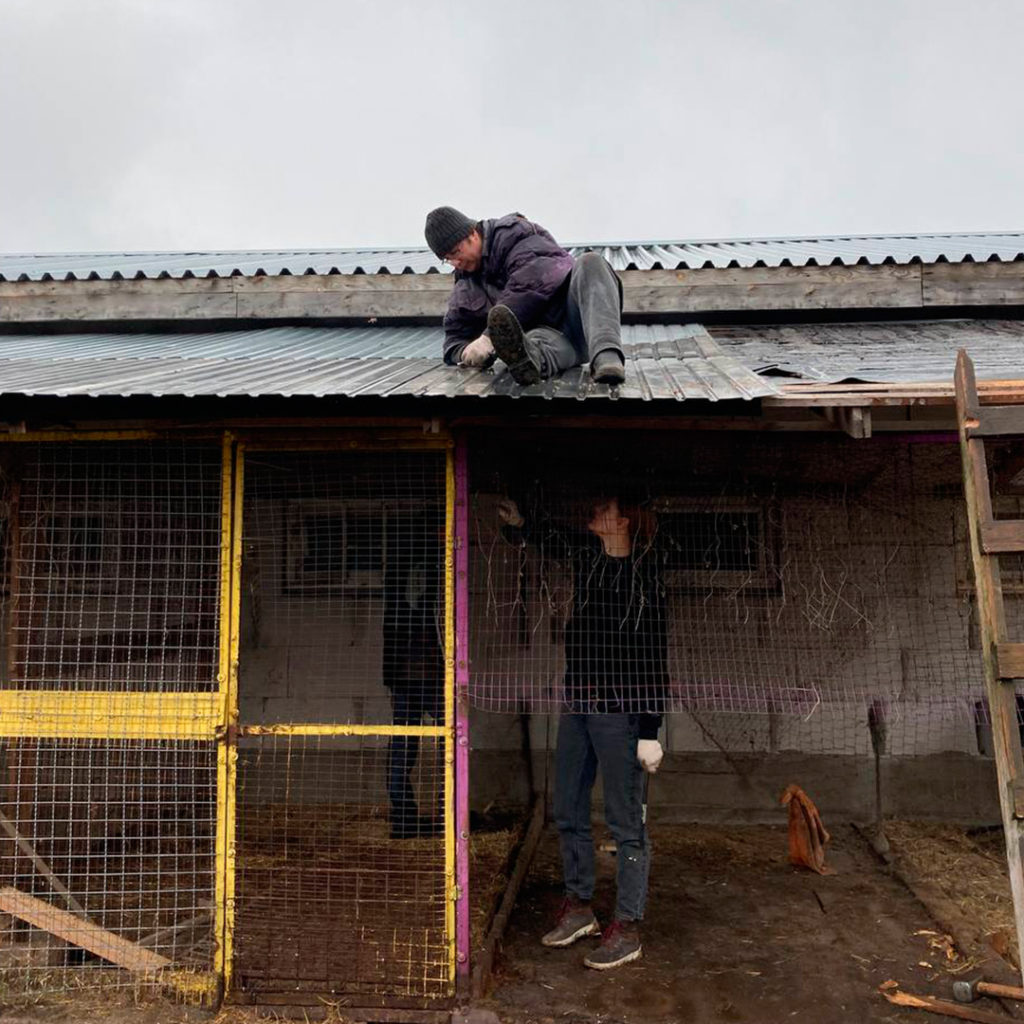
— You have a daughter? Wow! Why didn’t you go with your family and how did you endure the separation?
— My daughter is 15 years old, now she is in adolescence. She is in the 9th grade. She is generally phlegmatic. I am a phlegmatic person myself. My wife is not very emotional either. And the child has absorbed both of us! Maybe because she’s phlegmatic, she takes a long time to do her homework, and then you can hardly get her up in the morning. We are a family of night owls: we all like to sleep in the morning, and at night we wake up with a lot of activity.
We’ve never been apart for so long before—for a maximum of 2 weeks. And I’ve been married for 18 years! So it was hard when you have the habit of always having your spouse around. But I took it for granted. In addition, at that time I already realized that it should be so, it was safer. I understand the terrible conditions our heroes are in at the front, under constant shelling. Many people have lost their loved ones, property, and live at a distance from their families. That is why my problems and some of my troubles look very insignificant against this background.
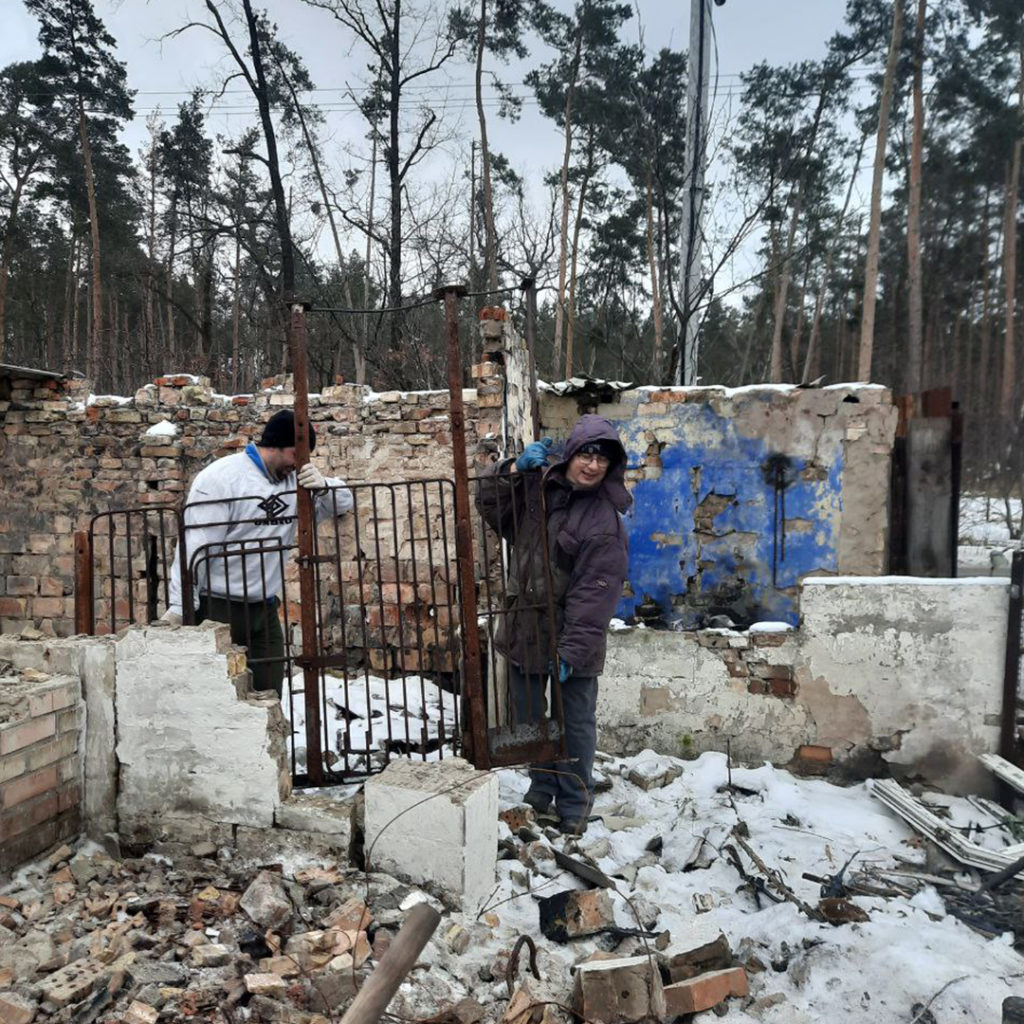
I was in Kyiv all the time. I had a naive hope that it would end quickly. Every day it was fading away… And my mother… She had an acute attack of sciatica at that time. She could not walk at all. I had to take care of her.
I didn’t go to the military enlistment office: I realized that I would be useless at the front: I had no combat experience, and my health was not good enough. By the way, in 2021, I passed a medical examination.
I then joined the so-called information troops, wrote appeals to foreign politicians, sent them photos. I helped internally displaced persons look for housing in western Ukraine. People apply, and there is a database of hosts who are ready to take them in. I had to connect these people with these owners, so to speak.
Then the whole horde left Kyiv. I started commuting to work and stopped volunteering for a while.
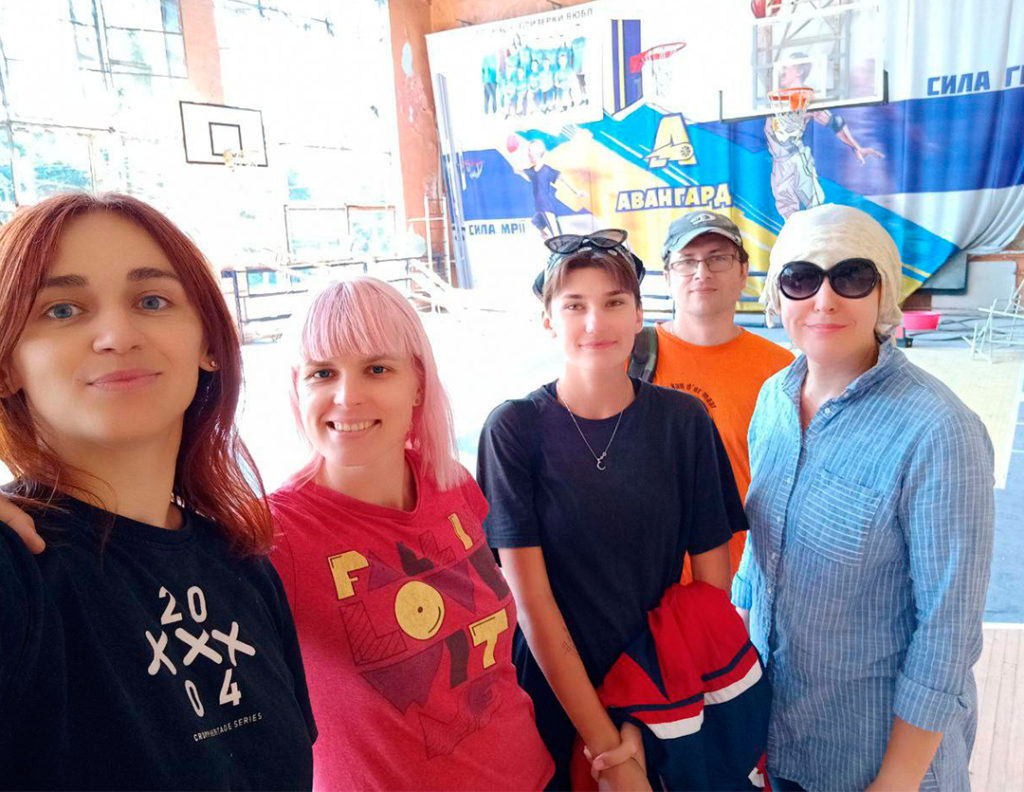
— If you ended up doing it, what motivated you to return to help, to join B50?
— I was actually looking for just such a work — to clear the rubble. There were a lot of hits, and someone has to clear it up.
I saw an announcement about B50 in one of the volunteer chats in the second half of July. The story went like this: at the beginning of the week I found another organization, and in the middle of the week I came across B50. I was attracted by the registration form. In that group, you had to look for a driver yourself and make arrangements. But here, you register, get assigned to a car, and you’re on your way. And at the end of that week, on July 23, I drove the B50 for the first time.
— You remember the dates so well! Can you remember the first day of volunteering with B50? What was special about it?
— It was in Irpin, a five-story building. There was a lot of work there, so I immediately found something to do. We barely kept up with the buckets.)
It was hard. I felt that in the afternoon my body started to disobey me: I walked in one direction, and it collapsed in the other. In the end, I took a break for 15 minutes, regained my strength, and got a second breath. Usually I need 5 minutes, but here it took 15. I took a breath and it felt better. I rested the next day. You know, surprisingly, there was no crepitus.

However, after football, I had such a stiff leg that I couldn’t walk. As children, we played football on the asphalt. I was most often the goalkeeper, who didn’t feel sorry for himself. I would go home, blood dripping, and I was happy. And it’s the same here.
By the way, when we moved to this house on Olimpiyska (metro station in Kyiv -ed), my father and I used to play football on the plot opposite, fenced with a concrete fence. Then my father organized to have this concrete fence demolished, arranged to bring a bulldozer, level the plot, and make a homemade gate. There used to be a house there. I remember that we kids used to get bricks from there. By the way, even then, I gained experience in rubble removal:) Later on, kids from all over the neighborhood asked to play on this playground. And all this was thanks to my father. A good example of community service! My parents are engineers, and I am a pure humanitarian. Perhaps my genes will wake up one day, but for now they don’t want to do it. My father worked at the Paton Institute, he was the head of a department. He was an Honored Inventor of Ukraine and had several copyright certificates for improving parts of welding machines. Unfortunately, he died early, when I was almost 12 years old.
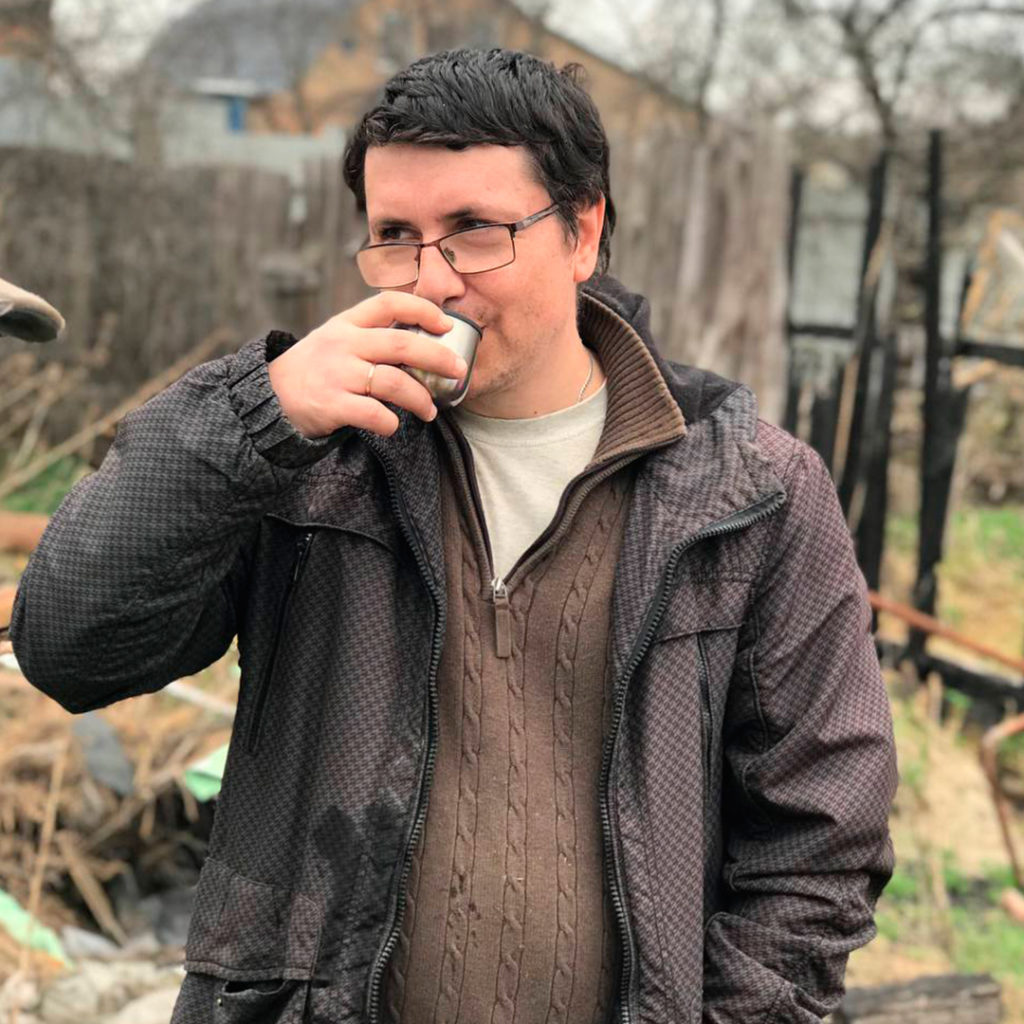
— What exactly gave you the impulse to volunteer with B50 so regularly? After all, it is not very easy to help physically, as you mentioned.
— When I started going, I immediately set a goal for myself: to be there once a week. But then I got involved. If possible, I tried to do it twice. I would go on Fridays, but my work doesn’t allow me to.
I’m an office clerk, I’m not used to this kind of work… I’ve never had a minor injury. A brick fell on my leg—nothing, we continue working. To be honest, I thought I was the first candidate for a serious injury. But I gained experience, and I developed a technique for handling something. My eyesight is not very good, and physical labor can affect it. Now I try to carry fewer wheelbarrows, preferably buckets.
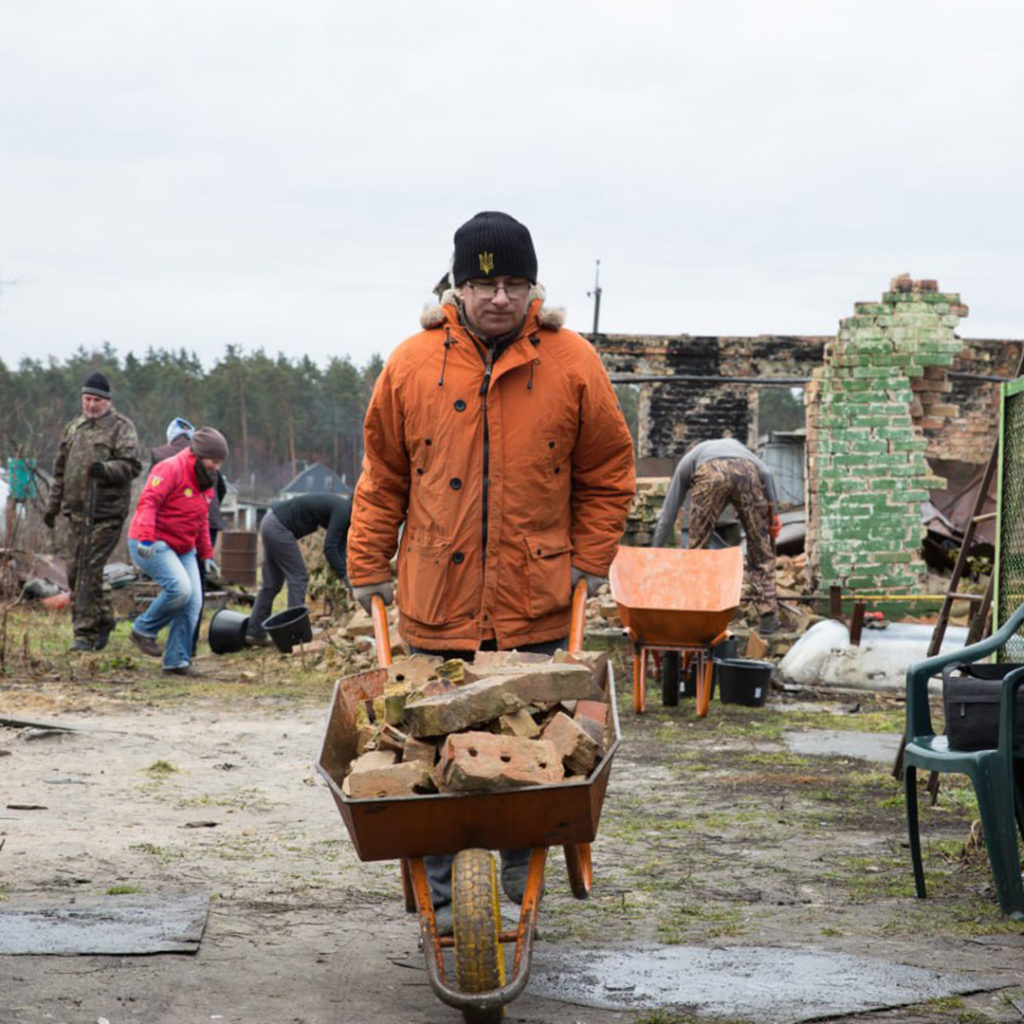
I don’t know if I can put it this way, but it became like an addiction. I mean, I want to come, help people, and do as much as I can. Plus, the company is great. Of course, it would be better if we met under different circumstances. But as it is. Everyone is a wonderful person. It is a pleasure to communicate with them and work together.
I believe that every conscious Ukrainian should be involved in at least some processes that can help. I can’t say that this is helping our victory. But it is help and participation in the recovery.
— Volunteering to clean up is the beginning of the reconstruction, for sure. But in addition to such help, you also find an opportunity to get involved in the organizational activities of B50. When do you have time?
— Somehow, internally, it’s not enough for me to go to Moshchun to help 1–2 times a week. I want to be involved in some other way. I have free time, and I want to spend it in a useful way. I see that my help is needed here. I can do it, so I do it. That’s all.
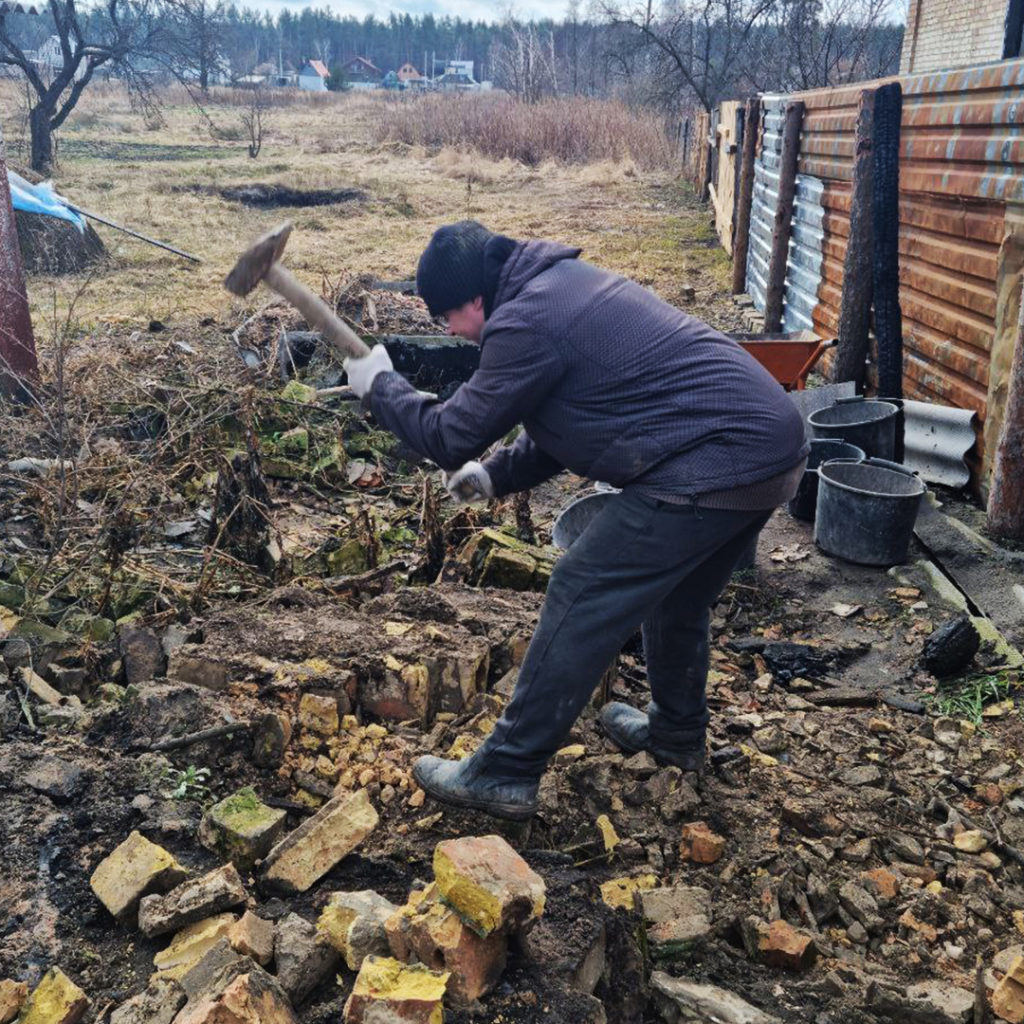
Now I am processing new applications from owners who need help. To be honest, I am not a very talkative person. But it’s not difficult for me to call, clarify details, ask questions, and make arrangements. Psychological support is also important for the owners, so that they don’t feel that they are left alone with their grief.
I make the registration table. I keep statistics on volunteers’ trips. I also process and upload photos to a disk. Especially after Sveta‘s trips, when 70+ photos are uploaded to the chat. I won’t say that each of these areas takes a lot of time. But if you put them all together, sometimes you don’t know where to start.
Does my family know about this line of work? No, they don’t. I sit at my computer and that’s it. If they read this interview, they will know:)

— At the same time, you continue to work in the civil service. What do you do at the Ministry of Education and Science, and how long have you been working there?
— 20 years in one place… I’m generally persistent. I am used to this work, I am one of the most experienced in my field. I support the implementation of scientific and technical projects under the State Order.
There are officially approved priority areas for the development of science and technology, and we work according to them. I am in charge of the Rational Use of Natural Resources, which includes the agricultural sector, ecology, and the metallurgical industry.
The Ministry announces a tender. Potential contractors determine which projects they will submit. Then there is a three-stage examination of the projects, and the government makes a decision on who to allocate funds to. This is close to the implementation of grant competitions. But the level is slightly higher because it is a government order.
I accompany projects from the competition and preliminary examination to the acceptance of reporting documentation.
Here’s an example. I recently supported a project whose executors did a great job advertising it. And this, in my opinion, is not enough, because implementation (the practical realization of the results of the work) is important to us. The project was implemented by Lviv Polytechnic. They developed a plant based on the technology of preliminary aerobic-reagent treatment of leachate from solid waste landfills. When they were testing the plant, it was installed at the Hrybovychi landfill, and journalists were there to cover it. It seems to be still in operation at that landfill.
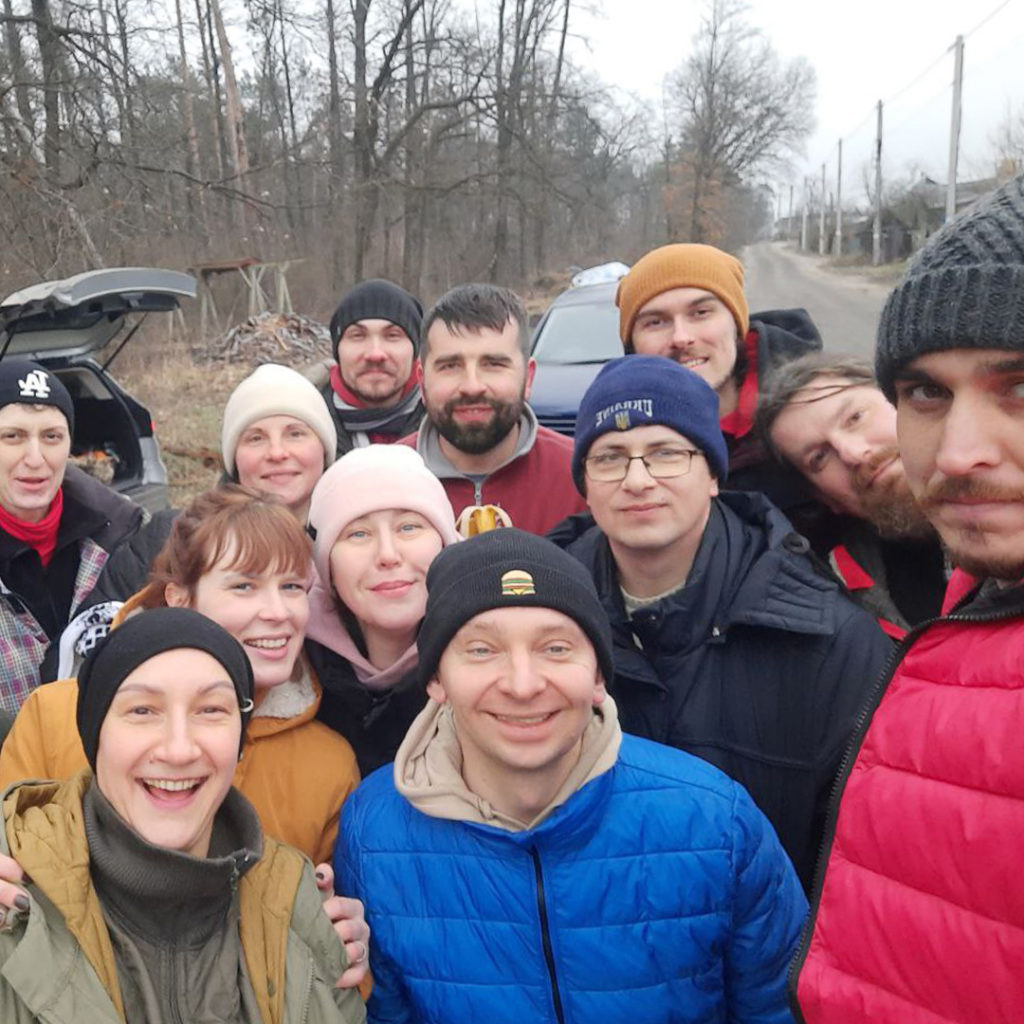
— I remember the big shelling of Kyiv in October, when russian missiles fell in the Shevchenko Park area, a few meters from where you worked. You told me that you usually went to work that way at that time. How is it in your office now?
— This hit was on October 10, and I was on vacation at the time. Our office was destroyed, the wall fell out. The situation in the offices on the ground floor with windows facing the boulevard is even worse. I also had to clear the rubble at work.)
Our department has now been allocated space in the second building of the Ministry of Education and Science. We were moved in with local employees, some of us were given offices, some even with a parrot 🙂 To be honest, we all want to return to Shevchenko Boulevard. At the end of last year, repairs began there. According to various predictions, we will return either in September or by the end of the year.
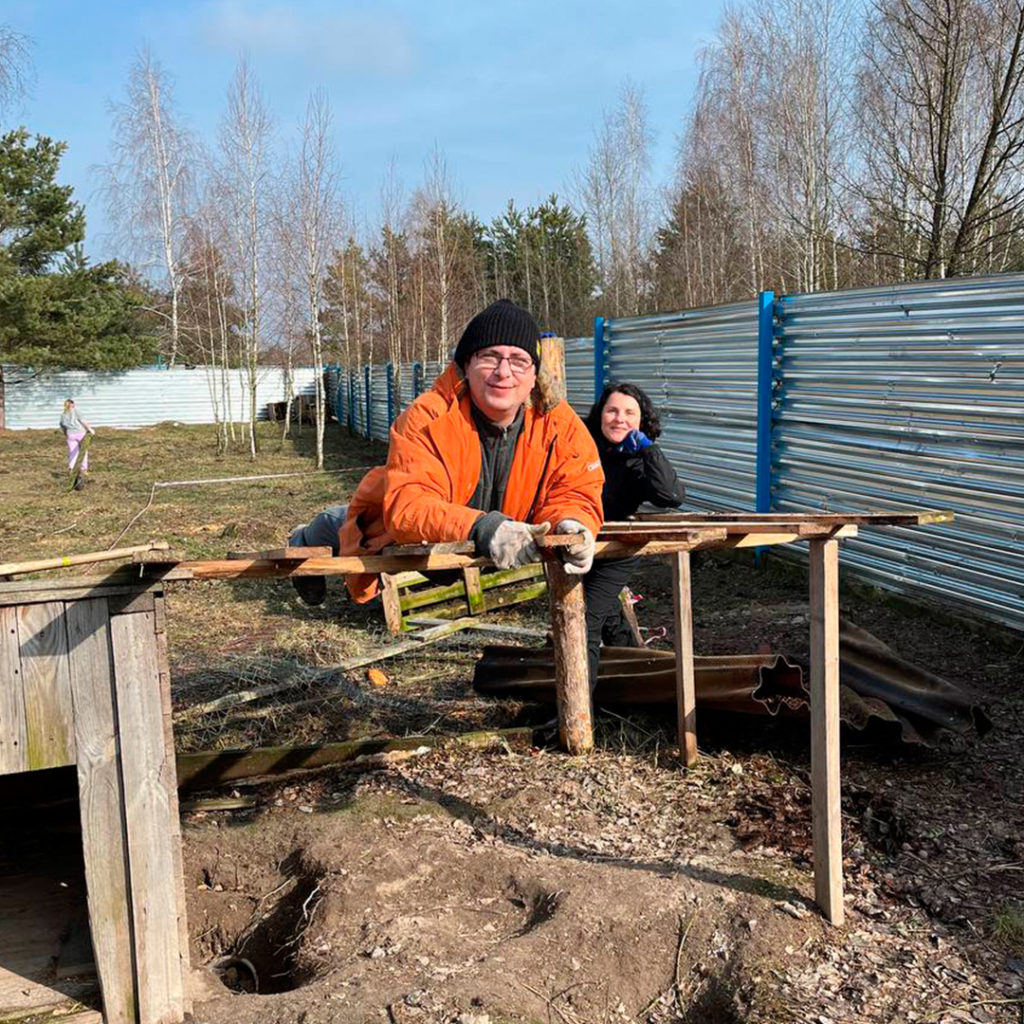
— What are your predictions for the future of our country?
— What Ukraine will look like depends on when the war ends. To be honest, I think many Ukrainians need to work and change their mentality. This is not an easy process. But they need to be more respectful and loving towards their country, the place where they live, and their fellow citizens. I try to teach my daughter to do this. And if everyone has their own children, then at least the next generation will be more responsible.
What about the war is a very difficult question. For myself, honestly, I don’t see any vision of its end. Signing a peace agreement—on what terms? It is impossible to give up our territories. What if the Nazis say: “Take all the territories, we will leave here. Forgive us?” This, of course, will not happen. Will they quietly withdraw? I have a hard time believing that. That’s why it’s very difficult to predict.
After the war, there will be devastation and economic decline. Unfortunately, there is no escape from this. We will rebuild! Every Ukrainian should make every effort to participate in the rebuilding of our country.
Interviews were conducted by:
- Coordinator — Anna Norynska
- Interviewer — Nataliia Hryniuk
- Transcriber — Maria Naumchyk
- Editor — Kateryna Lehka
- Build editor — Bohdan Holovchenko
- Translation — Yuliia Habdulova


